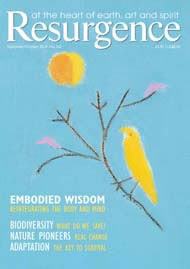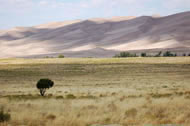For those of you who aren’t familiar with the globetrotting, spirit-lifting adventures of Peter Owen Jones, he is the British Anglican vicar and writer who from time to time moonlights as a presenter for the BBC, for whom he filmed a documentary called 80 Faiths around the World.
This whirlwind tour of 80 of the world’s religious traditions made for gripping TV. From voodoo to polygamy, Pentecostal serpent handlers to Korean shamanism (and taking in six big world faiths), Owen Jones explored them all, participating in sometimes obscure rites, and managing (most of the time) to retain his composure, while courageously questioning the tenets of his own faith.
The prequel to this, however, was Extreme Pilgrim. Narrower in focus, the programme examined a handful of paths to enlightenment – spiritual alternatives to Western Christianity, which the presenter declared to be too much a faith of the head, and not enough a faith of the heart.
The final episode revolved around a pilgrimage in the Sinai desert. Eager to gain some insight into the hermit lifestyle followed by St Anthony, a Christian saint and monk from Egypt, Owen Jones spent 21 days alone in a cave, in prayer and contemplation. In the course of his retreat in the arid wilderness – a landscape of wind-sculpted rock formations and shifting sand dunes – the vicar got writing, and the result is Letters from an Extreme Pilgrim: Reflections on Life, Love and the Soul.
These eloquent – and, crucially, riveting – epistles are directed towards those, he says, who have shaped his being. Here are tender, heartfelt letters to family and friends, as well as thoughts on bigger issues addressed to a pantheon of infamous and exalted figures, among them Satan, St Anthony, Jesus and Osama bin Laden. The vicar has plenty to say to all, and that he does so with a rare combination of raw candour, diligence, flair and humanity is gratifying.
In place of diatribes, intellectual posturing, or tedious proselytising, we are privy to genuine musings, gentle probings, expressions of affection, bewilderment, and concern. How many parish priests would have the generosity of spirit to end a letter to Satan (questioning the source of his hatred and ruminating on the perils of fear and loneliness), with an ‘all my love’?
Yes, in places, Owen Jones talks of God. However, enjoyment of this memoir hinges on a belief not in divinity, but rather in the sacredness of all life. He says, refreshingly: “The notion of proving the existence of God looks increasingly ludicrous to me, as does the notion of disproving it”.
In fact, the most beguiling letters are those in which he talks of love and enchantment. Take, for example, the impassioned letter to his ex-wife: “Darling Jacs,” he begins, charting the course of their (one imagines, highly charged) relationship, “You were and you still are one of the most beautiful women I have ever met…” Only the stoniest of hearts could fail to melt on reading this.
Fittingly for a memoir exploring the nature of relationships, and the gifts, lessons and sorrows they bestow on us, Letters from an Extreme Pilgrim prompts the reader to delve into his or her own soul and examine whatever truths, fears, loves and longing reside there. And for that we must give thanks, in some part, to the primordial silence of the desert.








